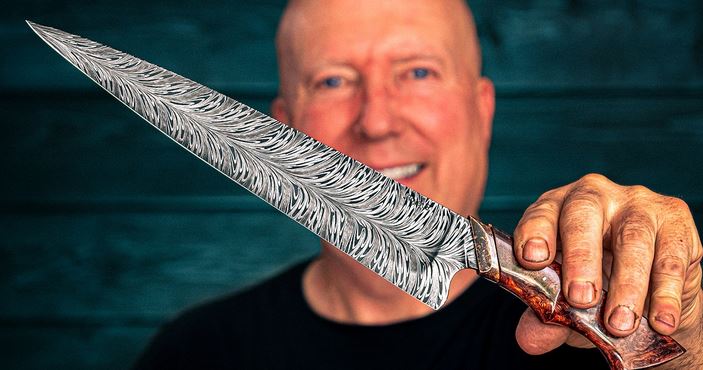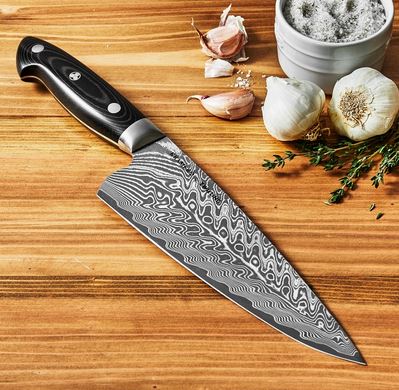There’s something undeniably mesmerizing about the swirling patterns on a damascus steel knives. These stunning blades not only captivate the eye but also boast incredible functionality and durability. Whether you’re a seasoned chef or just starting your culinary journey, having a quality knife can make all the difference in your kitchen experience.
But what exactly makes Damascus steel knives so special. From their rich history to unique characteristics, this guide will take you through everything you need to know about these exquisite tools. Get ready to explore the world of Damascus steel where artistry meets utility.
What is damascus steel knives?
Damascus steel is a type of steel known for its idiosyncratic designs, often like flowing water. This ancient material combines different types of metal to create a blade that is both beautiful and incredibly strong.
The working process includes layering numerous steels and forging them together through heat and beating. This technique not only enhances the knife’s durability but also gives it unique designs that are highly sought after by collectors and chefs alike.
Originally crafted in regions like Syria, this fascinating metal has roots that trace back centuries. Its popularity surged due to its ability to hold a sharp edge while resisting corrosion.
Today, modern techniques have revived traditional methods, allowing artisans to produce stunning Damascus knives with remarkable performance characteristics. Each piece tells a story merging artistry with craftsmanship in every cut.
History and Origins of Damascus Steel Knives
The history of Damascus steel dates back to ancient times, with its roots traced to the Middle East. It is believed that artisans began forging this remarkable material as early as 300-500 AD. The unique patterns in the metal were not merely for aesthetics; they reflected a sophisticated metallurgical process.
Originally used for weaponry, Damascus steel became famous for its strength and ability to hold a sharp edge. The famed swords were known for their resilience in battle, often sought after by warriors and nobility alike.
The term “Damascus” itself likely comes from the city of Damascus in Syria, where these techniques flourished. Early blacksmiths combined different types of iron and steel using complex methods like folding and welding, creating blades with distinctive swirling patterns a hallmark of true craftsmanship.
As time passed, knowledge spread across cultures, influencing various regions while keeping the essence of traditional techniques alive.
Characteristics and Benefits of Damascus Steel Knives
Damascus steel knives are renowned for their stunning aesthetics and exceptional performance. Each blade boasts unique patterns formed through the fusion of different metals, creating a masterpiece that catches the eye.
One significant characteristic is their sharpness. Damascus steel retains its edge longer than many other materials, making it ideal for precision cutting tasks. This durability translates to less frequent sharpening, which is a boon for both home cooks and professional chefs.
Another benefit lies in their toughness. The layered construction provides resilience against chipping or breaking under stress. This means your knife can withstand rigorous use while maintaining its integrity.
Additionally, these knives offer excellent corrosion resistance due to the careful selection of alloys used in production. They can handle moisture-prone environments without succumbing to rust easily.
The combination of beauty, functionality, and longevity makes Damascus steel knives an appealing choice for anyone looking to elevate their culinary experience.
How to Care for Your Damascus Steel Knives
Caring for your Damascus steel knife is essential to maintain its beauty and functionality. Start by hand washing the blade with warm, soapy water after each use. Avoid placing it in the dishwasher, as high heat and harsh detergents can damage both the blade and handle.
Dry the knife immediately with a soft cloth to prevent rust formation. It’s crucial to keep moisture at bay since Damascus steel is prone to corrosion if neglected.
Regularly apply a light coat of mineral oil or food-safe oil on the blade. This creates a protective barrier against moisture while enhancing its stunning patterns.
Sharpening should be done using whetstones or honing rods designed for stainless steel blades. Take care not to over-sharpen; just enough to maintain that razor edge will suffice.
Store your knife properly preferably in a wooden block or magnetic strip to avoid nicks and scratches that could diminish its aesthetic appeal.

Different Types of Damascus Steel Knives Patterns
Damascus steel is renowned not only for its performance but also for its stunning aesthetics. The patterns created during the forging process are truly unique and varied.
One popular pattern is the “Raindrop.” This design resembles droplets of water, showcasing a beautiful, organic flow. It’s both elegant and functional.
Another common style is the “Ladder” pattern, characterized by parallel lines that resemble rungs on a ladder. This creates a striking visual appeal while maintaining strength.
The “Waves” pattern mimics ocean waves with fluid curves that draw attention yet offer practicality in cutting tasks. Each piece tells its own story through these intricate designs.
There’s the “Twist” pattern which features spiraling lines that can appear almost hypnotic. Each knife becomes a work of art, reflecting craftsmanship and personality within every slice you make.
Famous Brands and Makers of Damascus Steel Knives
When it comes to Damascus steel knives, several brands and makers stand out in the culinary world. Shun is renowned for its exceptional craftsmanship, blending traditional Japanese techniques with modern design.
Another notable name is Dalstrong. Their knives are not only functional but also visually striking, often featuring intricate patterns that showcase the beauty of Damascus steel.
For those seeking a blend of tradition and innovation, Wüsthof offers expertly crafted options that cater to both professional chefs and home cooks alike. Each knife reflects their commitment to quality and precision.
On the artisan side, custom makers like KAI provide personalized creations tailored to individual preferences. These bespoke pieces often tell a story through their unique designs.
Each brand brings something special to the table, making them favorites among cooking enthusiasts everywhere.
Practical Uses for Damascus Steel Knives
Damascus steel knives are more than just beautiful tools; they excel in various practical applications. Chefs appreciate their sharpness and edge retention, making meal prep a breeze. Slicing through meats or dicing vegetables is effortless with these finely crafted blades.
Home cooks also find value in Damascus steel for everyday kitchen tasks. From filleting fish to chopping herbs, the versatility of these knives shines through.
Beyond the kitchen, outdoors enthusiasts use them for camping and survival situations. Their durability ensures they can handle tough cutting tasks like skinning game or preparing firewood.
Artisans often choose Damascus steel for crafting custom pieces due to its unique patterns and strength. The aesthetic appeal complements functional design beautifully.
Whether used in culinary arts or outdoor adventures, Damascus steel knives prove indispensable across various settings.
Tips for Choosing the Right Damascus Steel Knives for Your Needs
Choosing the right Damascus steel knife can be a rewarding experience. Start by considering your primary use. Are you preparing gourmet meals or tackling everyday kitchen tasks?
Next, pay attention to blade size and shape. A superior chef’s knife is versatile, while a paring knife excels in exactness work.
The grip feels just as significant as the knife-edge. Look for ergonomic designs that fit comfortably in your hand for extended use without fatigue.
Weight matters too some prefer heavier knives for stability; others choose lighter ones for agility.
Research different brands and patterns. Each offers unique qualities and aesthetics, making personal preference key when selecting your perfect piece of craftsmanship.
Conclusion:
Damascus Steel Knives are not just tools; they embody artistry, history, and functionality. Understanding the rich background of Damascus steel enhances your appreciation for these knives. With their unique characteristics and myriad benefits, it’s no wonder that chefs and enthusiasts alike gravitate toward them.
Caring for your Damascus steel knife ensures longevity and sustained performance. The various patterns available allow you to choose a blade that resonates with your personal style while catering to practical needs in the kitchen or beyond. Renowned brands continue to craft exceptional pieces that marry tradition with innovation.
With so many options available today, selecting the right Damascus steel knife can elevate your culinary experience. Whether you’re a professional chef or an avid home cook, investing in quality is essential.
Embracing the beauty and utility of Damascus Steel Knives opens up new possibilities in cooking and food preparation. You’ll find yourself more connected to each slice, chop, or dice as you wield a tool steeped in craftsmanship and heritage.
